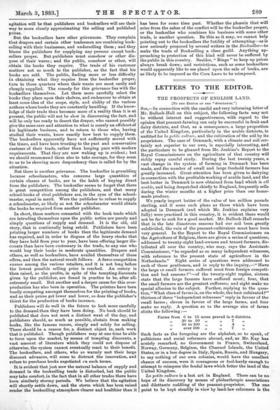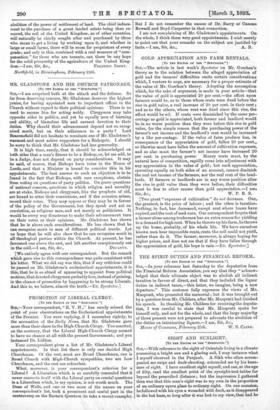LETTERS TO THE EDITOR.
THE PROSPECTS OF ENGLISH LAND.
[To THE EDITOR OF THE " EPECTATOR."1
Sta,—In connection with the candid and very informing letter of Mr. Bullock-Hall on this subject, the following facts may not be without interest and suggestiveness, with regard to the opinion that peasant-farming can only be successful in fruit and dairy districts, and that, as a consequence, a large proportion of the United Kingdom, particularly in the arable districts, is unfitted for /a petite culture, and the cultivation of the soil by its proprietors. The case of Denmark, with a climate and soil cer- tainly not superior to our own, is especially interesting, and the particulars to be gleaned from Mr. Jenkins's Report to the Royal Commissioners on the agriculture of that country will richly repay careful study. During the last twenty years, a vast change in the system of farming in Denmark has been made, and the number of small and large freehold farmers has greatly increased. Great attention has been given to dairying in connection with the profitable working of arable land, and the best butter in Denmark is now obtained from laud which is all arable, and being despatched chiefly to England, frequently sells during the winter months at a higher price than our home- made produce.
We yearly import butter of the value of ten million pounds sterling, and if some such plans as those which have been adopted in Denmark (and which Mr. Jenkins explains very fully) were practised in this country, it is evident there would not be far to seek for a good market. Mr. Bullock-Hall remarks that in the late disastrous seasons had our soil been. greatly subdivided, the ruin of the peasant-cultivators must have been very general. In the Report to the Royal Commissioners on the Agriculture of Belgium, there are given a series of questions, addressed to twenty-eight land-owners and tenant-farmers, dis- tributed all over the country, who may, says the Assiatant- Commissioner, "be regarded as so many independent witnesses, with reference to the present state of agriculture in the Netherlands." Eight series of questions were addressed to each of these gentlemen, and in reply to the inquiry,—" Have the large or small farmers suffered most from foreign competi- tion and bad seasons P"—of the twenty-eight replies, sixteen state that the large farmers have suffered most; four, that the small farmers are the greatest sufferers; and eight make no special allusion to the subject. Farther, replying to the ques- tion, "What class of farms is, on the whole, the best cultivated P" thirteen of these "independent witnesses" reply in favour of the small farms ; eleven in favour of the large farms, and four make no reply. A question as to the average size of farms elicits the following :— Farms from 6 to 15 acres prevail in 8 districts.
20 to 50 „
PI
7
50 to 100 „
4 „ over 100 „
SI
7
1`,
Such facts as the foregoing are the alphabet, so to speak, of politicians and social reformers abroad, and, as Mr. Kay has acutely remarked, no Government in France, Switzerland, Norway, Germany, Belgium, the Channel Islands, the United States, or in a less degree in Italy, Spain, Russia, and Hungary, to say nothing of our own colonies, would have the smallest chance of success, were it courageous or fool-hardy enough to attempt to reimpose the feudal laws which fetter the land of the United Kingdom.
La petite culture is a lost art in England. There can be no hope of its discovery by means of philanthropic associations and dilettante coddling of the peasant-proprietor. The one point to be kept steadily in view by land-law reformers is the abolition of the power of settlement of land. The chief induce- ment to the purchase of a great landed estate being thus re- moved, the soil of the United Kingdom, as of other countries, will naturally be chiefly sought after and purchased by those who mean to get a living by working upon it, and whether in large or small farms, there will be room for proprietors of every grade; and only in this, combined with a real measure of "com- pensation " for those who are tenants, can there be any hope for the solid prosperity of the agriculture of the United King- Northfield, in Birmingham, February 2414.



































 Previous page
Previous page